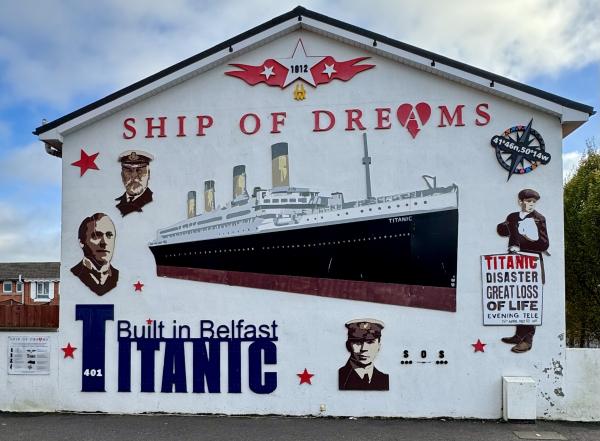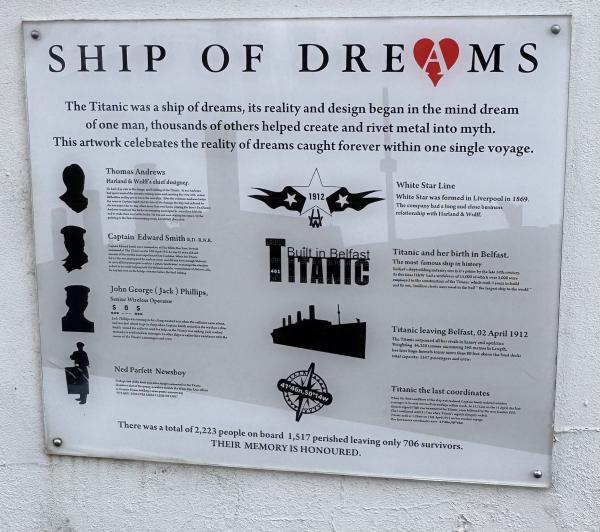Ship of Dreams
Top Section:
"SHIP OF DREAMS" (in large red letters)
"1912" (inside a red ribbon with stars on either side)
Coordinates: "41°46'N, 50°14'W" (near a compass-like symbol)
Middle Section:
The word "TITANIC" (on the ship's side)
"Built in Belfast" (beside the word "TITANIC")
Bottom Section:
"TITANIC" (in large blue letters)
"401" (small number near the word "TITANIC")
"S.O.S" (written with dots and dashes underneath)
"TITANIC DISASTER GREAT LOSS OF LIFE" (on a sign held by a boy)
"Evening Tele" (below the disaster message)
"15th April 1912" (below the "Evening Tele" text)
Transcription of the text from the plaque titled "SHIP OF DREAMS":
SHIP OF DREAMS
The Titanic was a ship of dreams, its reality and design began in the mind dream of one man, thousands of others helped create and rivet metal into myth.
This artwork celebrates the reality of dreams caught forever within one single voyage.
Thomas Andrews
Harland & Wolff's chief designer
"Andrews had the dream of designing an ‘unsinkable ship’ but, in reality, he was to lose his life to a colossal engineering mistake. Andrews took great pride in his work, adjusting blueprints daily on his voyage until the Titanic hit the iceberg. On hearing the news, he toured every cabin and instructed passengers to don lifejackets and proceed to lifeboats. He himself did not make it."
Captain Edward Smith L.D. E.N.R.
"Captain Edward Smith was one of the best sailors in the world. He had been the White Star Line's most respected captain, known for his calm demeanor and ability to command. He served 43 years on the ocean until his first and last voyage on Titanic. After the collision, he was last seen on the bridge."
John George (Jack) Phillips
Senior Wireless Operator
"S.O.S. operator and a great navigator. Phillips stayed onboard, sending messages that saved hundreds of lives. He eventually lost his life to the sea, still at his post, calling for help as the ship went down."
Ned Parfett Newsboy
"A London newsboy whose famous image was taken outside of the Times Building, announcing the disaster. He died in action three years later during the First World War."
White Star Line
"White Star was formed in Liverpool in 1869. The company had a long and close business relationship with Harland & Wolff."
Built in Belfast
TITANIC
[Illustration of the Titanic with the text "Built in Belfast" and "Titanic"]
Titanic and her birth in Belfast
The most famous ship in history
"Robert Falconer Keith designed Titanic’s safety features for the late 19th century, unaware of the rapid developments of the 20th. Titanic was 882 feet 9 inches long, weighed 46,328 tons, had a maximum speed of 23 knots, and was equipped with 16 watertight compartments. ‘Not even God could sink this ship’ was the largest ship in the world."
Titanic leaving Belfast, 02 April 1912
"The Titanic’s voyage had all the trimmings luxury and elegance. Weighing 46,328 tonnes she travelled from Belfast to Liverpool, her voyage from Southampton to New York took 4 days from her initial start. The Titanic weighed 882 feet in length and 175 feet above the boat deck, total capacity, 3547 passengers and crew."
Titanic the last coordinates
41°43'N, 50°14'W
"These coordinates mark the location of the Titanic when she struck the iceberg and eventually sank. A tragic symbol of human ambition, innovation, and vulnerability."
There was a total of 2,223 people on board. 1,517 perished leaving only 706 survivors.
THEIR MEMORY IS HONOURED.
Information
Belfast
County Antrim
Tags
Location of Ship of Dreams Mural
Map of location of Ship of Dreams mural and any nearby murals.
Have you got Google Earth on your computer? If so, then download the Google Earth view of Ship of Dreams.
Is this the wrong position for Ship of Dreams? If you think so, then suggest to modify its position.
Comments about Ship of Dreams
There now follows 1 comments about Ship of Dreams. You can also (no signup required).
The Titanic was built in Belfast at the Harland and Wolff shipyard, symbolizing the city's industrial might. Its tragic sinking is a poignant chapter in Belfast's maritime history.
You can add your own comments or suggets edits to this page.
 Virtual Belfast Mural Tour
Virtual Belfast Mural Tour

